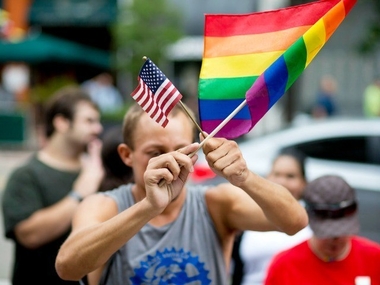Florida Republicans consider anti-discrimination bill for LGBT rights

TALLAHASSEE, Fla. (AP) — When it comes to LGBT issues, Florida's Republican lawmakers are known more for trying to keep transgender people out of bathrooms, protect pastors from marrying same-sex couples and seek exemptions for private adoption agencies who don't want to place children with gay and lesbian couples.
But this year, some Republican lawmakers are backing a bill that would give lesbian, gay, bisexual and transgender residents the protection against discrimination.
"It's a breakthrough for the South. It's of huge significance that a Southern state — the third largest in the country — is taking this up. It is the first time that a Southern legislature will be contemplating passage of a bill that affirms rights, not takes them away," said Nadine Smith, CEO of Equality Florida.
In a sign that Republican attitudes on LGBT issues are shifting, the Senate Judiciary Committee will consider the bill during a meeting Monday. Similar measures have been filed for about a decade and neither chamber of the Republican-dominated Legislature has given it a hearing until now.
Instead, expansion of gay rights such as same-sex marriage and allowing gay and lesbian couples to adopt children has been achieved through the courts.
It's not that Republicans as a whole have suddenly become gay friendly. Far from it. While the anti-discrimination bill would be the most far-reaching gay rights legislation enacted in Florida, there is a Republican-sponsored bill that would allow health care providers and hospitals to refuse treatment of gays based on religious beliefs. The same bill would allow any individual to refuse service to gay customers based on their personal religious beliefs. And there are House and Senate bills that would change Florida law to say churches can't be forced to marry same-sexcouples.
"You have my bill on one side, and you have their bill(s) on the other side," said Republican Rep. Holly Raschein, the House sponsor of the anti-discrimination bill, which has nine Republican co-sponsors. "Sometimes you take two steps forward, three steps back, but that's all part of the battle."
While the bill prohibits any discrimination against the LGBT community, supporters are focused on its economic impact. The bill is being called the "Competitive Workforce Act" and a group running a campaign to promote it is backed by AT&T, Wells Fargo, Marriott and Carnival Corporation. The argument is that Florida will be able to attract corporations that provide high-paying, high-skilled jobs and the workforce to fill them if it has clear anti-discrimination laws.
"Republicans are able to see that this is not only the thing to do, but it's also the right thing to do from a competitive standpoint," said Patrick Slevin, the campaign manager for Florida Businesses for a Competitive Workforce. "It's not just the employees that we're trying to recruit, it's also their families. When they're looking at job offers across the country, it's going to be taxes, it's going to be education, it's going to be safety and it's also going to be diversity."
Raschein also sees it as good politics for Republicans who are trying to recruit younger voters who aren't as conservative on social issues.
"I can't count the number of young Republicans who've reached out to me saying 'This isn't even an issue for us.' They look at this as liberty. One of the pillars of our party is liberty, equality, freedom," she said.
Still, social conservatives oppose the bill. The Florida Family Policy Council has told supporters in emails that the bill "a dangerous piece of legislation" that would be among laws around the country that are "used as weapons to punish Christians living out their faith."
The group's president, John Stemberger, is encouraging opponents to speak out against the bill in committee Monday. He doesn't buy the argument that the bill will help Florida's economy.
"To infuse somehow that these non-discrimination laws are going to bring gays into town and that's going to stimulate the economy and we bring the 'best and brightest' ... that's just an incredible insult to the general population as if we're not the best and the brightest, that you have to engage in some kind of alternative sexual behavior or lifestyle in order for you to be the best and the brightest," Stemberger said. "That's really junk economics."
By Brendan Farrington, AP. Copyright 2016 The Associated Press. All rights reserved. This material may not be published, broadcast, rewritten or redistributed.
The Gayly - 2/7/2016 @ 1:20 p.m. CST





